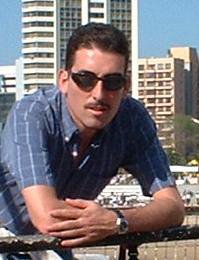Who is leaking what?
It is curious how a federal investigation into who was responsible for exposing Valerie Plame as a CIA agent to journalists has become a leak in itself.
The New York Times has been reporting this week, with tremendous accuracy, on the direction of the grand jury inquiry. It quoted "lawyers with knowledge of the investigation" as saying that notes in the hands of Special Prosecutor Patrick Fitzgerald allegedly show that Vice President Dick Cheney discussed Valerie Plame´s status as a CIA spook with his chief of staff Lewis Libby weeks before she was publicly burned in the press. It isn´t clear whether Vice President Cheney (Mr. Haliburton himself) or Libby actually committed any crime. However, Cheney was quoted in a television interview on NBC in 2003 after Plame was exposed that he didn´t know who she was.
Someone who gave the NYT the information about the notes has to be someone who is working with Fitzgerald. When I covered federal grand jury investigations for The San Juan Star in Puerto Rico, many of my sources were federal investigators. Sometimes these officials get frustrated when they have evidence at hand but cannot pin a certain crime on an individual. They look for other ways to tarnish their would-be target´s image by going to the press. Many reporters, myself included, salivate when they are given something that should otherwise be kept secret, such as evidence presented to a grand jury. All grand jury proceedings are secret. Federal law states that anyone who deals with these proceedings -- prosecutors, FBI agents, court clerks -- can be prosecuted for revealing what happens inside the closed room where a panel of about 16 private citizens meet to weigh in evidence and decide whether or not to indict.
Journalists like to throw out the 1st Amendment when it comes to publishing something about a grand jury. Prosecutors counter that while they believe in the 1st Amendment, their job is to also protect the guarantees of potential criminal defendants, such as preserving their rights to a fair trial and due process. Those constitutional rights thrown in all together outweigh a reporter´s right to know, prosecutors say.
Whether or not Fitzgerald or someone in his office is the source of the NYT article will remain unclear. In any case, Fitzgerald must have known or authorized the leak. Suspicions arose when the article didn´t say that the reporters who covered the story made any attempts to contact Fitzgerald´s office for a comment. News editors, who do have some sense of ethics, know that it´s not right to quote an unidentified source in a story and later say in that same story that that source was unavailable for comment. The editor would be misleading readers into thinking that the unidentified source is a different person. But it happens all the time.
In the meantime, the inquiry is putting the heat on Libby and President Bush´s favorite boy Karl Rove. Just reading the news stories, I am sure they haven´t been sleeping well at night this past week. And who would with the possibility of an indictment and prison time hanging over your head?


0 Comments:
Post a Comment
<< Home